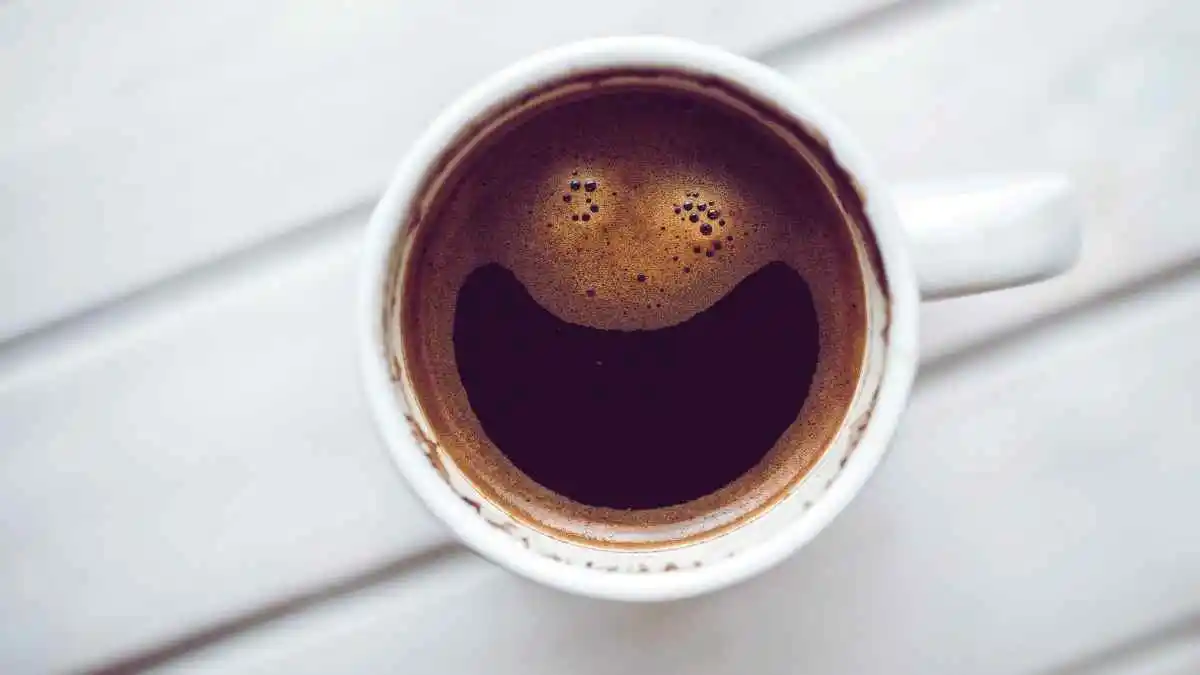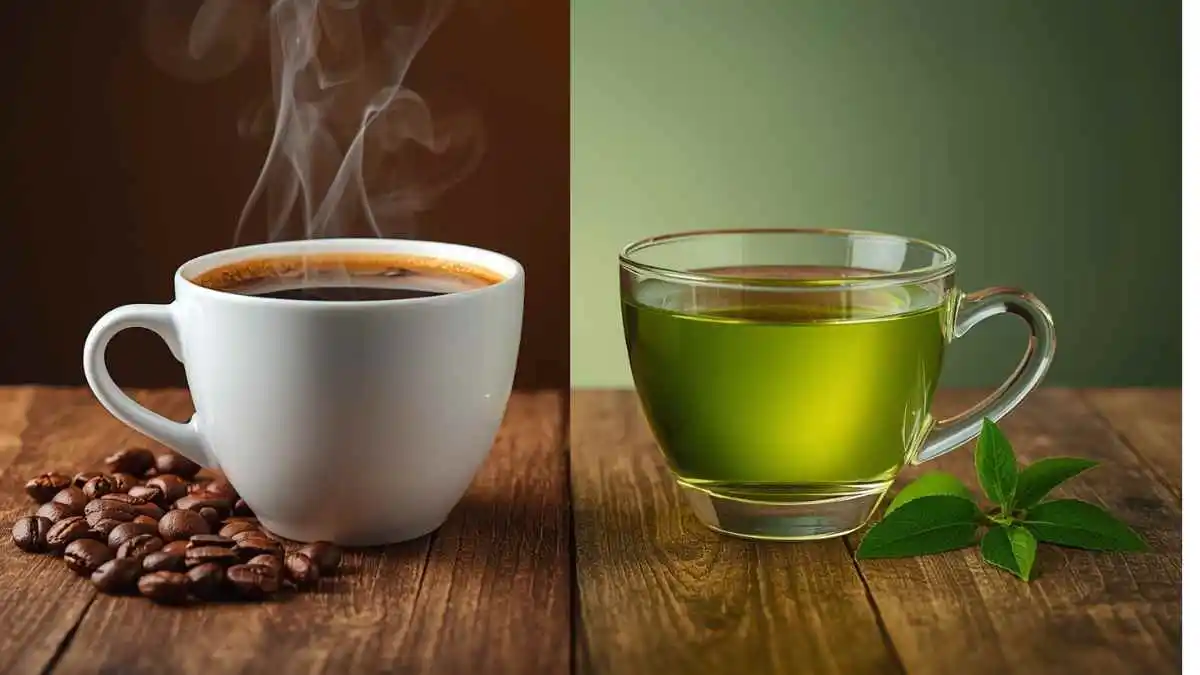Coffee: Contains about 95 mg of caffeine per 8 oz cup.
Green Tea: Contains about 30-50 mg of caffeine per 8 oz cup.
Caffeine is a natural stimulant found in coffee, tea, chocolate, and some energy drinks. It works by stimulating the central nervous system, which helps increase alertness, concentration, and energy levels.
So, What Has More Caffeine Coffee Or Green Tea?
What is It and How Does It Work?
Caffeine has become the go-to for many people who need a mental or physical boost.
While both coffee and green tea contain caffeine, the levels vary considerably between the two.
The difference is important because it helps determine how each drink affects your body.
Caffeine Content in Coffee:

Coffee is known for being the beverage of choice when people want a stronger jolt of energy.
An 8-ounce cup of brewed coffee typically contains about 95 milligrams of caffeine, although this amount can vary depending on the brewing method and type of coffee.
Why Does Coffee Have More Caffeine Than Green Tea?
There are a few reasons why coffee contains more caffeine than green tea:
-
Coffee Beans Have More Caffeine: Coffee beans naturally contain more caffeine than tea leaves. The caffeine concentration in coffee beans is generally higher, which translates into higher caffeine content in your cup of coffee.
-
Brewing Process: The way coffee is brewed also influences its caffeine content. Methods like drip brewing, espresso, and French press all extract caffeine efficiently from the beans. For example, espresso coffee packs a lot of caffeine in a small 1-ounce shot, while brewed coffee offers a larger volume of liquid but still contains more caffeine overall.
-
Bean Variety: Different coffee beans contain different amounts of caffeine. Robusta coffee beans, for instance, have almost twice as much caffeine as Arabica beans, which are the most commonly used type.
Caffeine Content in Green Tea:

On the other hand, green tea is often seen as a gentler alternative to coffee, both in flavor and in caffeine content. An 8-ounce cup of green tea contains about 30-50 milligrams of caffeine on average, which is about half of what you would find in a typical cup of coffee.
Why Does Green Tea Have Less Caffeine Than Coffee?
There are several reasons why green tea has less caffeine than coffee:
-
Tea Leaves Have Less Caffeine: While both tea leaves and coffee beans come from plants, tea leaves naturally contain much less caffeine than coffee beans. This is why tea generally offers a more subtle pick-me-up compared to coffee.
-
Gentler Brewing Process: Green tea is typically brewed at a lower temperature than coffee (around 160-180°F compared to coffee’s 190-205°F), which means it extracts less caffeine during the brewing process.
-
Type of Tea: While most types of green tea have a similar caffeine range, certain green teas like matcha can have higher caffeine content. This is because matcha is made from powdered tea leaves, meaning you consume the whole leaf, which results in more caffeine. Matcha can contain up to 70 milligrams of caffeine per 8-ounce cup, which is closer to the caffeine content of black tea.
Read Next: How Much Caffeine In Green Tea vs Black Tea vs Coffee | Which Has More Caffeine?
How Caffeine Affects Your Body:
Both coffee and green tea can offer health benefits due to their caffeine content, but they can also have different effects depending on the amount consumed.
1. Effects of Caffeine:
-
Increased Alertness: Caffeine works by blocking adenosine, a neurotransmitter that promotes sleep. This leads to a feeling of increased alertness and focus.
-
Improved Physical Performance: Caffeine can also stimulate the release of adrenaline, which can help improve physical endurance and performance.
-
Diuretic Effect: Both coffee and tea can increase urine production, leading to more frequent trips to the bathroom. However, people who regularly consume caffeine tend to develop some level of tolerance to this effect.
2. Side Effects of Too Much Caffeine:
-
Anxiety and Jitters: High doses of caffeine can cause symptoms like nervousness, restlessness, and heart palpitations. This is more common in people who are sensitive to caffeine or consume large amounts.
-
Insomnia: Consuming too much caffeine, especially later in the day, can interfere with your ability to fall asleep.
-
Stomach Issues: Coffee, in particular, can irritate the stomach lining and cause acid reflux or indigestion in some people.
Coffee vs. Green Tea: Which One is Healthier?
While both coffee and green tea offer health benefits, there are some differences worth noting.
1. Health Benefits of Coffee:
-
Rich in Antioxidants: Coffee is one of the biggest sources of antioxidants in the Western diet. These antioxidants help protect your cells from oxidative stress and damage.
-
Mental Boost: Coffee’s higher caffeine content makes it a popular choice for increasing mental alertness and fighting fatigue. It may also reduce the risk of neurodegenerative diseases like Alzheimer’s and Parkinson’s in the long run.
-
Increased Physical Performance: Studies have shown that coffee can enhance athletic performance by increasing adrenaline levels and fat burning.
2. Health Benefits of Green Tea:
-
Rich in Polyphenols: Green tea is loaded with polyphenols, particularly catechins, which have strong antioxidant properties. These antioxidants can help prevent cell damage and reduce the risk of chronic diseases.
-
May Aid in Weight Loss: Some studies suggest that green tea can help with fat loss by increasing metabolism and fat oxidation. This is partly due to its caffeine content and high levels of antioxidants.
-
Promotes Heart Health: Green tea has been linked to improved heart health. It may help lower LDL cholesterol levels, reduce blood pressure, and improve overall cardiovascular health.
Coffee vs. Green Tea – Which Has More Caffeine?
Coffee has more caffeine than green tea, but both beverages have their unique benefits.
If you’re looking for a strong, immediate energy boost and don’t mind the potential side effects of more caffeine, coffee is your best bet. However, if you prefer a gentler energy lift with added health benefits, green tea might be a better choice.
Ultimately, the right choice for you depends on your personal preferences, your caffeine tolerance, and how your body responds to each beverage.
Both coffee and green tea are excellent drinks, but they offer different levels of caffeine and health benefits.
References:
-
Harvard T.H. Chan School of Public Health, “Caffeine: How Does It Affect Health?”
-
Mayo Clinic, “Caffeine Effects on Health,” Mayo Foundation for Medical Education and Research.
-
National Institutes of Health (NIH), “Caffeine and Health: A Review of the Literature.”

